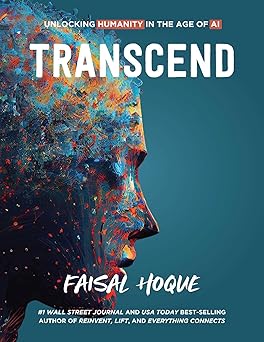An erudite consideration of a topic that is becoming increasingly complex.
Perhaps you view AI as fascinating and full of potential to drive innovations ranging from medical research to climate solutions. On the other hand, you might live in fear of the ramifications of ceding our choices and our will to a non-human entity poised to topple society. Either way, “The question is no longer whether we should use AI, but how we can use it responsibly and well.” Faisal Hoque guides readers through the era of Artificial Intelligence in Transcend: Unlocking Humanity in the Age of AI. Favoring precision over concision, the author presents logical, well-reasoned arguments that are impartial and free from emotion. The comprehensive examination of the effects of AI on society is arranged into three parts. The first section offers ideas on how to deal with profound inquiries on conceptual questions. What does it actually mean to be human? In what ways are our choices subtly and overtly influenced by AI? Should we worry equally about every advancement brought about by AI? The largest section provides two distinct blueprints that Hoque aptly dubs OPEN and CARE to help us embrace possibilities and act with concern for the ramifications. Intended to address unanticipated technological shifts, the chapters speak to individuals, businesses, and governments, laying the groundwork to prepare for potential challenges and take advantage of unprecedented opportunities. The closing salvo is a true call for humanity, an appeal to deal with the AI revolution with wisdom, humility, flexibility, and love.
Faisal Hoque takes an epistemological approach to examine the foundations and future of AI, explore potential outcomes, consider ethical implications, and take reasonable precautions as we barrel toward an uncertain but certainly exciting future. The author regularly draws philosophical parallels to encourage critical thinking on a topic frequently clouded by opinions and biases. A few case studies demonstrate the strategies in action and help readers imagine the OPEN and CARE techniques in their own lives and businesses. These contemporary examples of organizations and individuals pivoting with changing technologies, along with interesting thought exercises and deep meditative questions, offer plenty of food for thought. Scholarly, expository writing contributes to text that is dense and challenging to digest for general audiences, and although frequent enumerations, content breakdowns, acronyms, previews, and recaps keep the information well-organized, they impede the overall pace. An erudite consideration of a topic that is becoming increasingly complex, Transcend sheds light on AI innovations and the myriad ways humans can harness the potential to avoid being left behind in its wake.







